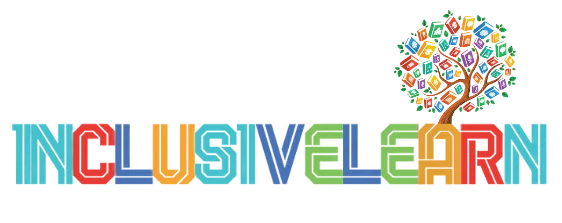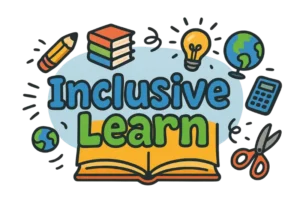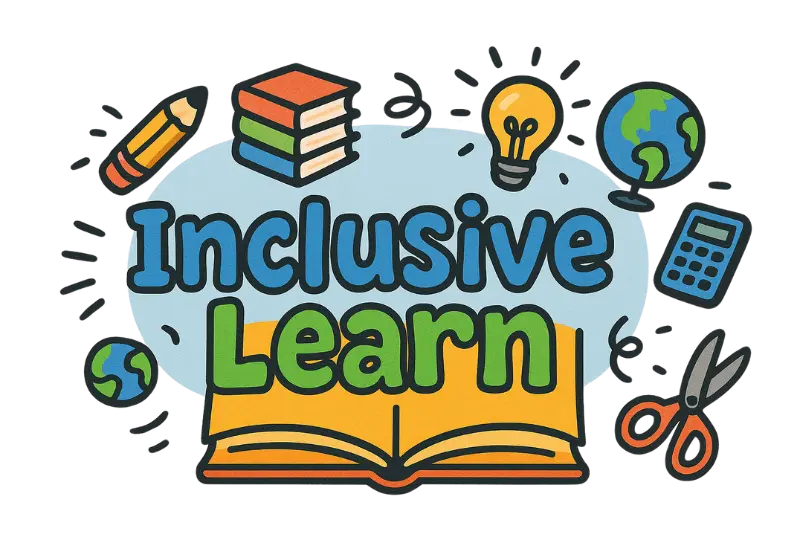Spelling isn’t just about writing words correctly, it’s a key part of building strong reading and writing skills that will benefit your child for years to come. In fact, mastering spelling can be one of the most important steps toward helping children become confident readers and effective communicators.
This guide is designed to help parents and teachers improve children’s spelling while also enhancing their overall language skills. By breaking down the best ways to practice spelling, offering age-specific word lists, and providing helpful strategies, this post will give you the tools to boost your child’s spelling ability in a way that’s fun, easy, and engaging.
Why Spelling is Crucial for Kids’ Language Skills
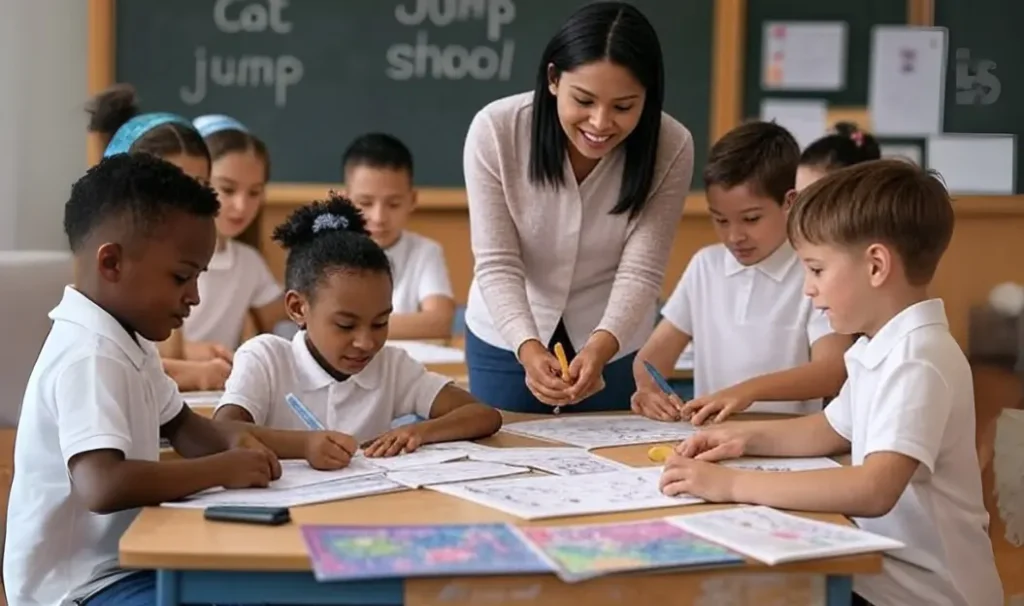
The Relationship Between Spelling and Reading
Did you know that when kids can spell well, they read better too? That’s because spelling and reading are closely connected. When children learn to spell, they develop a stronger grasp of phonics—the relationship between letters and sounds. This understanding not only makes them better at sounding out new words but also improves their ability to comprehend what they read. So, every time they practice spelling, they’re also improving their reading skills.
Impact on Writing Skills
Correct spelling is vital for clear and effective communication. When kids spell words correctly, their writing becomes more polished and easier to understand. It also boosts their confidence in writing. Without the fear of misspelling words, kids can focus on expressing their ideas clearly and creatively. Whether they’re crafting short stories or writing essays, good spelling helps them convey their thoughts without distraction.
Building Confidence
Imagine how good it feels to know you’ve got something mastered! That’s what happens when kids become proficient at spelling. Their self-esteem rises because they know they can tackle tricky words without hesitation. With every spelling success, their confidence grows—not just in language, but in all areas of learning. It’s no surprise that kids who are strong spellers are often more confident in school.
Essential Spelling Words for Kids by Age Group
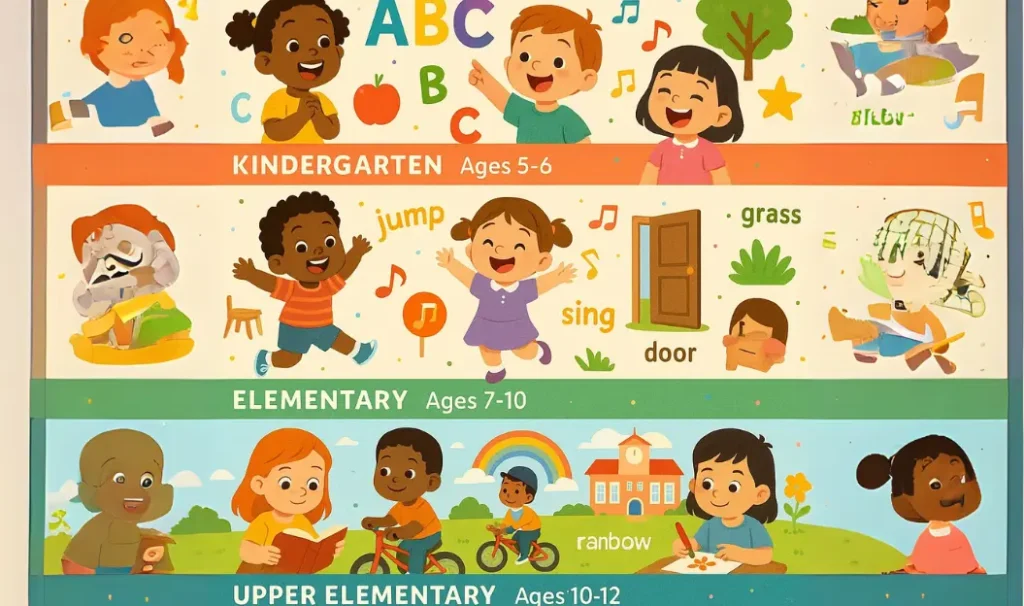
Preschool (Ages 3-5)
At this stage, you can focus on very simple, often used words that help kids start recognizing letter sounds. The more familiar the word is, the easier it is for them to learn.
- Car
- Apple
- Cup
- Ball
- Tree
- Bird
- Milk
- Star
- Moon
- Rain
Kindergarten (Ages 5-6)
In kindergarten, kids should be encouraged to spell more familiar objects and actions. These words help them connect their environment with language, expanding their vocabulary.
- Orange
- Happy
- Sing
- Jump
- Bear
- Fish
- Grass
- Door
- Chair
- Hand
Elementary School (Ages 7-10)
As kids progress, they start learning words that are more descriptive or related to things they might read in books or encounter in school. This encourages them to apply their knowledge of spelling to various subjects.
- Watermelon
- Flower
- Building
- Chocolate
- Schoolwork
- Rainbow
- Mountain
- Kitchen
- Bicycle
- Pencil
Upper Elementary (Ages 10-12)
Kids in upper elementary school are ready for words that are both academic and commonly used in higher-level texts. They might start encountering terms related to history, science, and other academic subjects.
- Electricity
- Photograph
- Temperature
- Comprehension
- Freedom
- History
- Memory
- Festival
- Laughter
- Calculation
Fun Ways to Teach Kids Essential Spelling Words
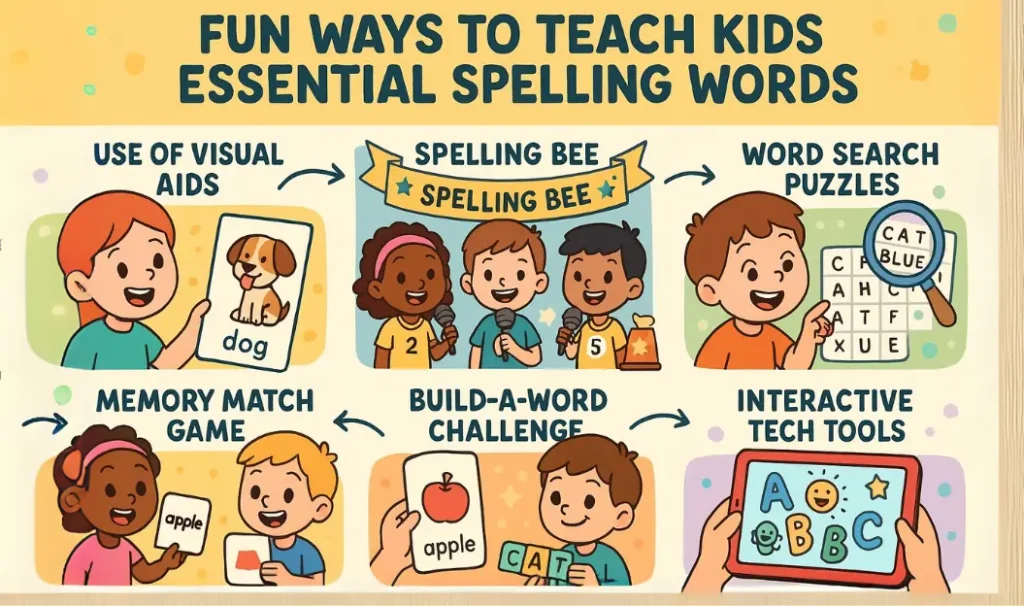
Learning spelling doesn’t have to be boring! When you make it fun, kids are more likely to stay engaged and enjoy the process. Here are some creative, interactive ways to teach kids essential spelling words:
Use of Visual Aids
Children are visual learners, so using images and flashcards can make a huge difference. For example, show them a picture of a dog, then write the word “dog” below it. Kids will begin to associate the word with the image, making it easier to remember the spelling. This approach helps reinforce the link between the letters and the meaning of the word. You can also create flashcards with the word on one side and a picture on the other.
Games and Activities
- Spelling Bee: The Classic Contest A Spelling Bee is a fun, interactive way to challenge kids while they learn. You can hold a mini Spelling Bee at home or in the classroom. Instead of just announcing the words, make it more exciting by offering small rewards for correct spellings, such as stickers or extra playtime. You could even make it a “team” event where kids work together to spell words, fostering teamwork and collaboration.
- Word Search Puzzles Kids love solving puzzles, so why not combine fun with learning? Create word search puzzles with spelling words. Set a timer to see how quickly they can find all the words, or make it a competition among siblings or classmates. You can also add a twist by giving them a hint: “The word is a color” or “The word has double letters.” This keeps them on their toes and engaged!
- Memory Match Game In this game, place cards with spelling words on one side and corresponding pictures on the other. The goal is to match the word to the correct image. For example, match the word “apple” to an image of an apple. This game helps kids reinforce their spelling while also strengthening their memory and concentration.
- Build-A-Word Challenge Use letter tiles (like Scrabble pieces or magnetic letters) to help kids physically build words. They can arrange the letters to form words, which gives them a hands-on learning experience. If you don’t have letter tiles, you can easily make your own with paper or cardboard. Challenge them to build as many words as possible within a certain timeframe.
- Interactive Tech Tools There are plenty of fun educational apps that can help kids practice spelling while having fun. Apps like SpellingCity or Endless Alphabet provide interactive games and activities that make learning spelling words feel like a game. Kids can enjoy learning at their own pace, and some apps even provide instant feedback to help them improve.
Strategies to Make Spelling Stick
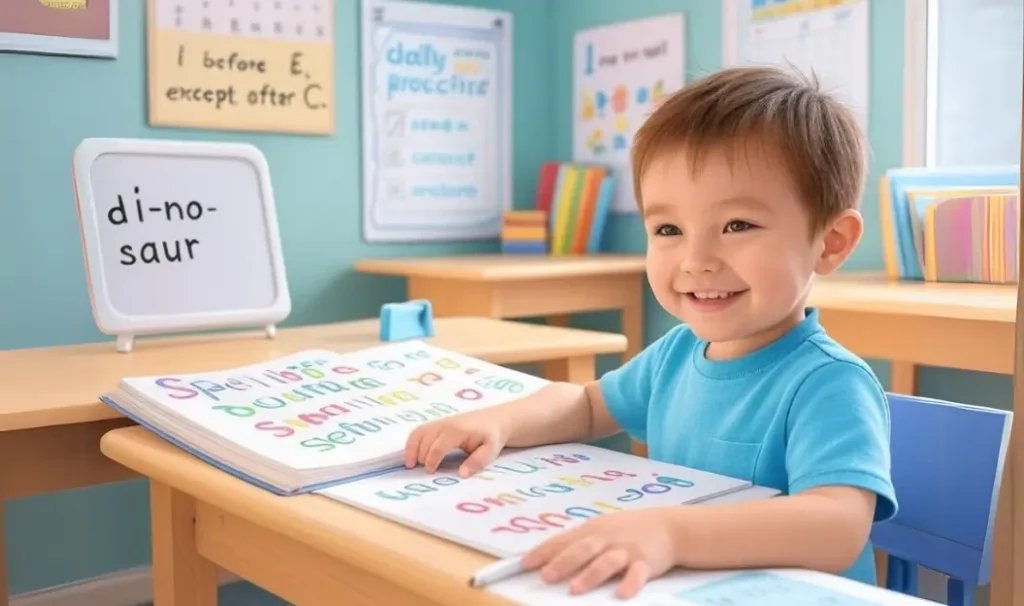
- Break Words Into Syllables: Show how breaking words into syllables makes spelling more manageable (e.g., “di-no-saur”).
- Use Mnemonics and Rhymes: Share creative tricks to help kids remember tough words (e.g., “I before E, except after C”).
- Daily Practice: Emphasize the importance of short, regular practice sessions to improve retention.
- Spelling Journals: Encourage kids to write down new words they’ve learned and use them in sentences.
- SEO Keywords to Target: “mnemonics for spelling”, “spelling practice techniques”, “spelling retention tips”
Common Spelling Mistakes and How to Overcome Them
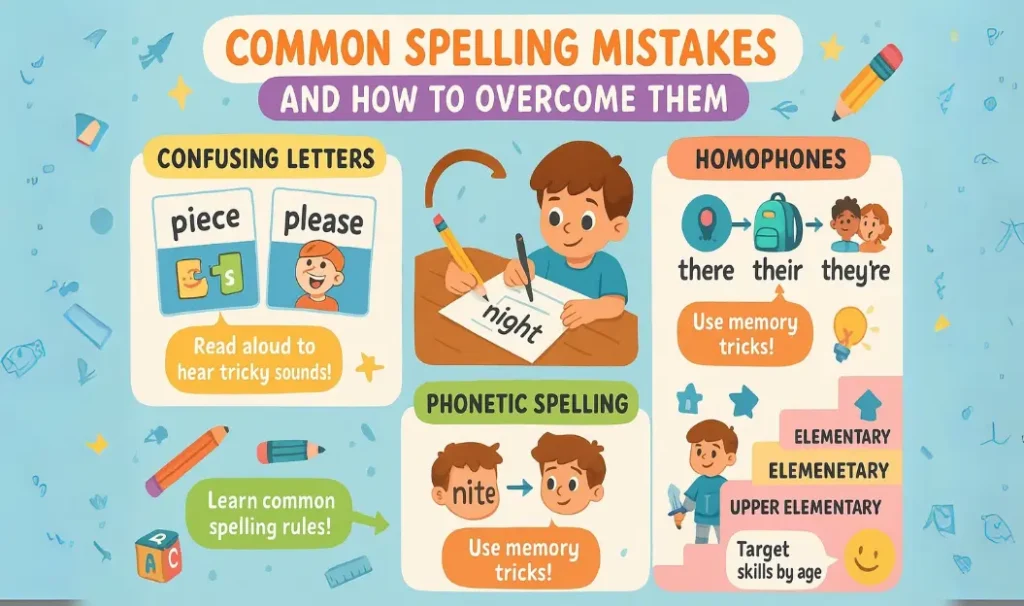
Even the best spellers make mistakes, and it’s all part of the learning process. Here are some common spelling challenges kids face and simple ways to help them overcome them.
Confusing Letters (e.g., I vs. E, C vs. S)
Some letter combinations can be tricky for kids, like the difference between “I” and “E” in words such as “piece” and “please”. A common confusion is also found between “C” and “S” in words like “cereal” and “serial”. To help kids master these tricky letters, make flashcards or create fun exercises where they practice these combinations until they become familiar. Also, when kids struggle with a specific letter, pointing out patterns in other words will help reinforce the correct usage.
Tip: Encourage them to read aloud to hear how the letters should sound in different words. This builds an awareness of sound-letter relationships.
Phonetic Spelling
Sometimes, children will spell words based on how they sound rather than the correct letters. For example, a child might spell “night” as “nite”. This is a normal part of learning, but it’s important to teach kids the proper spelling rules. One method is to focus on common spelling rules, such as how words with long vowel sounds are often spelled differently. For example, “made” and “maid” have different meanings and spellings, despite sounding similar.
Tip: Teach kids to always double-check their work after writing. Over time, they’ll learn to trust the rules they’ve been taught and stop relying on phonetics alone.
Homophones
Homophones are words that sound the same but are spelled differently. Examples include “there”, “their”, and “they’re”, or “to”, “too”, and “two”. These can be particularly tricky because children will often write the wrong word without realizing it.
Tip: Help kids understand the difference by creating simple memory tricks. For example, “there” is a place, “their” is for possession, and “they’re” is a contraction of “they are.” The more they practice, the easier it will be for them to remember which word to use.
Frequent Missteps by Age Group
Different age groups face different spelling challenges. Here are a few common mistakes:
- Preschool & Kindergarten: Often struggle with letter reversals (e.g., writing “b” as “d”).
- Elementary (Ages 7-10): Tend to mix up similarly spelled words (e.g., “your” vs. “you’re”).
- Upper Elementary (Ages 10-12): Struggle with more complex words, particularly when it comes to silent letters or irregular spellings.
To address these challenges, keep spelling practice consistent and don’t shy away from revisiting difficult words.
Resources for Parents and Teachers to Boost Spelling Skills
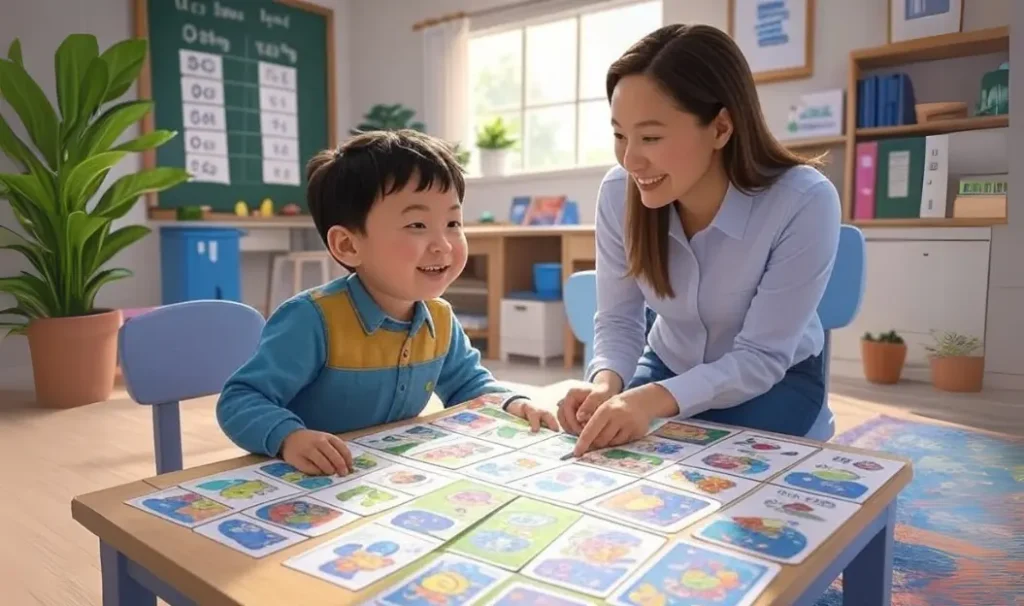
Helping kids improve their spelling can be made even easier with the right resources. Here are some tools and materials that can support spelling practice at home or in the classroom.
Books and Workbooks
There are countless books and workbooks designed to help children improve their spelling skills. These resources often include lists of spelling words, writing prompts, and fun activities that make learning easier. Look for books that focus on grade-level spelling words and provide exercises that challenge kids to use words in different contexts.
Tip: Find workbooks that cover a range of difficulty levels to cater to your child’s pace.
Apps and Online Games
Incorporating technology into learning can be a great way to engage kids. Apps like SpellingCity, Endless Alphabet, and Spell Down provide interactive lessons and games that make spelling feel like a fun challenge. Many of these apps include progress tracking, so you can see how well your child is doing over time.
Printable Flashcards and Charts
Flashcards are a tried-and-true method for helping kids memorize words. You can make your own, or download ready-made printable flashcards and charts from online educational websites. These are especially helpful for younger children who are just starting to master their letters and sounds.
Tip: Use color-coded flashcards to make learning more visually appealing. For example, red cards could feature difficult words, while green cards could be for words they’ve mastered.
School-Based Resources
For teachers, there are also numerous educational programs and classroom tools available to support spelling development. Programs like Words Their Way or Scholastic’s Spelling Practice provide structured lessons and word lists that can be integrated into the classroom curriculum.
How to Support Your Child’s Spelling Journey at Home
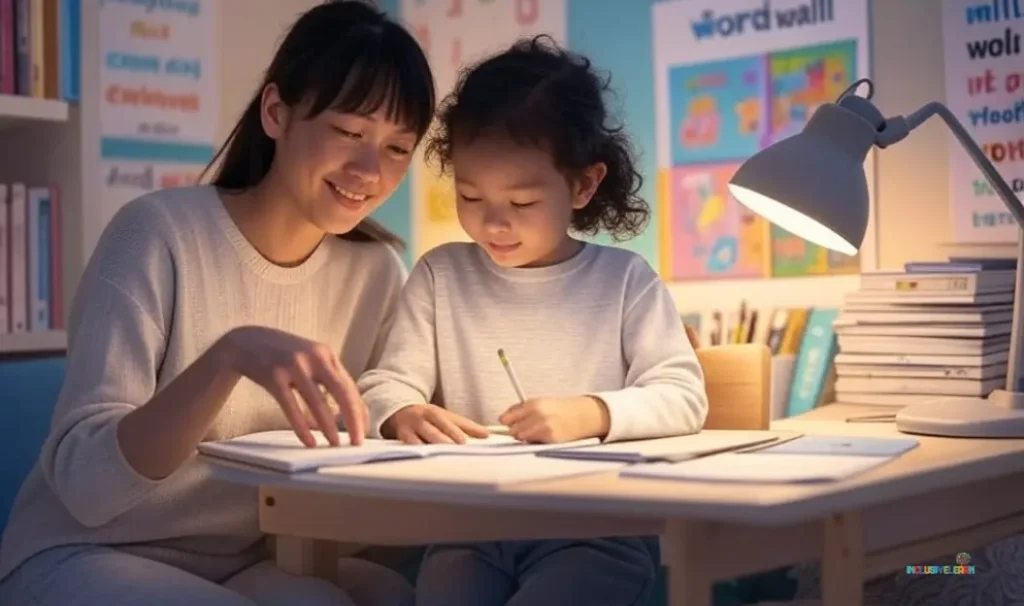
Spelling isn’t just something that happens in the classroom—it’s something that can be nurtured at home with the right support. As a parent or caregiver, you can play a key role in helping your child improve their spelling skills by integrating it into their daily routine.
Create a Spelling Routine
Setting up a consistent spelling routine is one of the best ways to help kids stay on track. Just like any other skill, spelling gets better with practice, and the more regularly kids work on it, the faster they’ll improve. Set aside a few minutes each day, preferably at the same time, to go over a few spelling words. You can make this time special by turning it into a fun, quiet activity with a dedicated space. Maybe after homework, or just before bed, they’ll look forward to their daily spelling practice.
Tip: Keep the routine short (around 10-15 minutes). The key is to make it consistent and part of the everyday schedule.
Positive Reinforcement
Kids learn best when they feel encouraged. Use positive reinforcement to reward progress, even small victories. Praise them for correctly spelling a difficult word, or offer a reward, such as a fun activity they enjoy, after completing a certain number of spelling words. This boosts their self-esteem and keeps them motivated.
Tip: Celebrate milestones. If your child masters a specific list of words, give them a special certificate or a fun family outing as a reward for their hard work!
Provide a Quiet, Focused Learning Space
When kids have a quiet space to work, they can concentrate better. Create a dedicated area for spelling practice that’s free from distractions like TV or toys. This will help them focus on the task at hand. A well-organized space with a desk or table and plenty of light can make a huge difference in how well they concentrate.
Tip: Decorate their space with colorful posters of spelling rules or a word wall, which can serve as a visual reminder for them.
Set Realistic Expectations
Remember that each child progresses at their own pace. It’s important to set realistic expectations for what they can achieve in a certain period. If a child is struggling with certain words, don’t rush them. Be patient, and take the time to revisit the words until they feel comfortable with them.
FAQs
How can I improve my child’s spelling fast?
Regular practice, breaking words into chunks, and using fun activities can help. Short, daily practice works better than cramming.
What age should my child start learning spelling words?
Spelling can begin as early as preschool (ages 3-5), starting with simple words. Let your child learn at their own pace.
Are there any easy spelling tricks for kids?
Yes! Try breaking words into syllables, using rhymes or songs, and connecting words to images. Mnemonics also help reinforce spelling.
How often should I practice spelling with my child?
Practice daily for 10-15 minutes. Short, consistent sessions are more effective than long ones.
What to do if my child is struggling with spelling?
Be patient and break words into smaller parts. Revisit tricky words often, and consider consulting a teacher or specialist for additional support.
Conclusion
A child needs correct spelling skills to advance their language abilities properly. They will excel in reading and writing while developing self-confidence through purposeful key spelling lessons presented with a playful approach. A short time period with scheduled practice along with proper materials and positive feedback will make your child become an exceptional speller.
